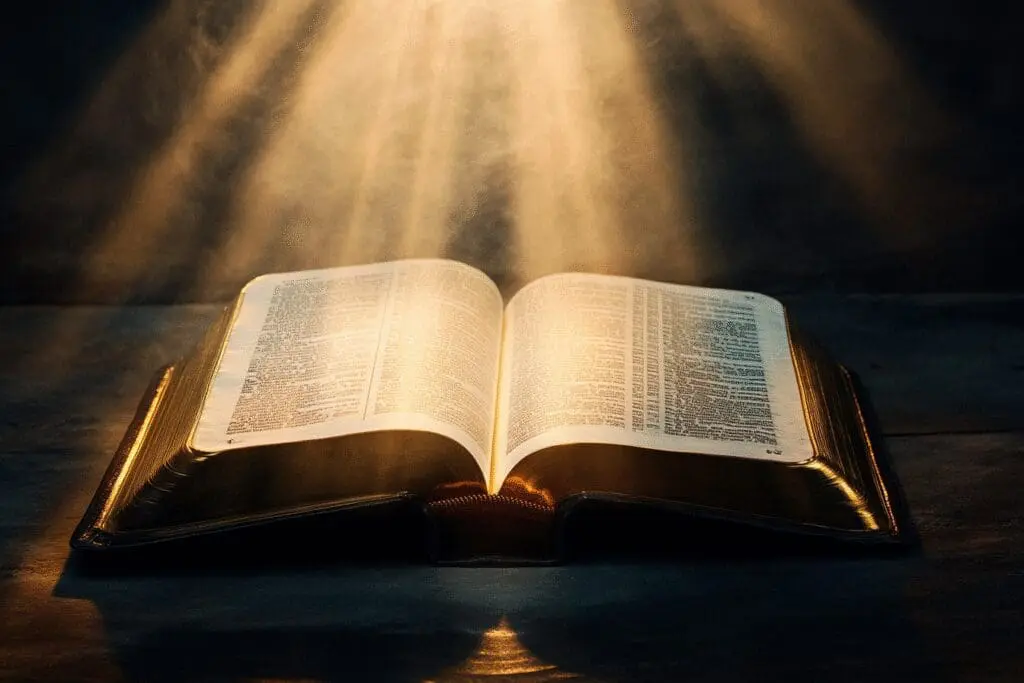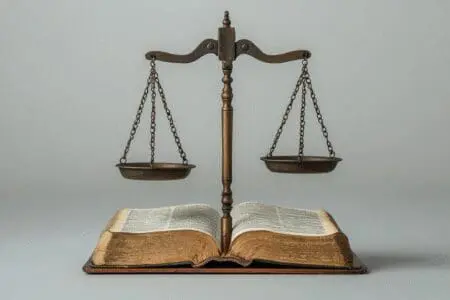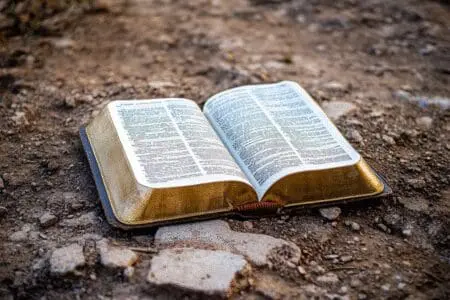Let’s be honest. For years, the Bible on my shelf was more of a decoration than anything else. It was a thick, intimidating book I felt I should read, but never actually did. It seemed old, out of touch, and frankly, a little boring. I figured it was a collection of ancient rules and confusing stories that had nothing to do with my life—my career, my relationships, my anxieties about the future.
I couldn’t have been more wrong.
My journey with this book didn’t start with a flash of lightning or some big, dramatic moment. It started quietly, with a simple, skeptical question: “Is there anything in here that can actually help me today?” That question led me down a path I never expected. I discovered that this ancient collection of texts wasn’t a dusty rulebook at all. It was a surprisingly practical, deeply human guide for navigating the chaos of modern life. If you’ve ever wondered why is the Bible important, I get it. I was right there with you. But I want to share what I found—not as a pastor or a scholar, but just as a regular guy who found something life-changing.
More in Bible Category
What Is the Strongest Evidence That The Bible Is Trustworthy
How Many Times Has the Bible Been Changed
How to Convince Someone That the Bible Is True
Key Takeaways
For those who just want the highlights, here’s what I’ve discovered about the importance of the Bible:
- It’s Not Just a Rulebook: Think of it more as a compass for decision-making, offering wisdom on how to live, not just a list of dos and don’ts.
- The People In It Are Messy: The characters are flawed, relatable humans who make huge mistakes. It’s a book about real life, not a showcase of perfect people.
- It Offers a Bigger Perspective: It connects our small, everyday lives to a grand, overarching story, giving a deeper sense of purpose.
- Hope That Feels Real: It provides a type of hope that acknowledges pain and suffering, rather than pretending they don’t exist.
- It Challenges Your Thinking: The Bible will push back on your assumptions about life, success, and what really matters.
- A Practical Guide to Forgiveness: It gives concrete examples and pathways for letting go of anger and resentment, which is one of the hardest things to do.
- It’s More Accessible Than You Think: You don’t need to be a theologian to get something out of it. Starting small with the right translation makes all the difference.
1. So, Can It Actually Help Me Make Real-Life Decisions?
I used to think that “biblical wisdom” was about following a checklist. Don’t do this, don’t do that. But when I was facing a huge career decision a few years ago, I was completely stuck. I had two job offers. One was safe, comfortable, and paid well. The other was a risk—less money, a startup culture, but it was work I felt genuinely passionate about.
I was paralyzed by the fear of making the wrong choice.
Out of desperation, I started reading the book of Proverbs. I wasn’t looking for a verse that said, “Thou shalt take the startup job.” What I found was something far more useful. It was a collection of short, punchy sayings about diligence, seeking advice, integrity, and the difference between short-term gain and long-term value.
But how can an ancient book help me choose a career?
It didn’t give me the answer. Instead, it gave me a framework for how to think about the decision.
- Seeking Counsel: Proverbs talks a lot about listening to advice. So, I did. I called friends I trusted, my dad, and a mentor from a previous job. I didn’t let them decide for me, but I gathered their perspectives.
- Thinking Long-Term: The book constantly contrasts the “get rich quick” path with the slow, steady path of hard work and character. It made me think beyond the next paycheck and consider which job would build me into the person I wanted to be in ten years.
- Integrity Over Everything: A lot of verses boiled down to a simple idea: Your character is worth more than your salary. It forced me to ask which workplace culture would better support my values.
I ended up taking the riskier job. It wasn’t easy, but it was the right call. The Bible didn’t make the choice for me, but it acted like a compass, guiding my thought process. That’s when I realized its importance isn’t always in providing direct answers, but in shaping the way you look for them.
2. It’s a Mirror for the Messy Parts of Life
One of the biggest surprises for me was that the Bible isn’t a highlight reel of perfect people doing heroic things. It’s full of messy, complicated, and deeply flawed individuals.
I mean, really flawed.
You have David, a celebrated king who was also an adulterer and a murderer. You have Peter, one of Jesus’s closest followers, who publicly denied even knowing him when things got tough. You have Jacob, a patriarch of the faith, who was a liar and a manipulator. The list goes on and on.
Aren’t the people in the Bible all saints?
Not even close. And that’s what makes it so powerful. For a long time, I felt like I had to hide my own failures and insecurities. I felt like being a “good person” meant projecting an image of having it all together. But reading these stories felt like a huge weight was lifted.
I saw myself in their struggles.
I saw my own impatience in Moses, my own doubt in Thomas, and my own fear in Peter. These weren’t characters in a fable; they were real people wrestling with pride, fear, and failure. Seeing their stories, and seeing how they were still used and loved, gave me permission to be honest about my own mess.
It taught me that my life isn’t defined by my worst moments. It showed me that faith isn’t about being perfect; it’s about what you do after you’ve fallen apart. That, for me, was a game-changer. It’s a book that isn’t afraid of the dark, and it makes you less afraid of your own.
3. Finding a Bigger Story to Be Part Of
Most days, my life feels pretty small. I wake up, I go to work, I answer emails, I pay bills, I try to get to the gym, and I go to bed. It’s easy to feel like a cog in a machine, just going through the motions. I think a lot of us feel that way. We’re searching for a sense of purpose, a feeling that our small, seemingly insignificant lives actually matter.
This is where the Bible completely shifted my perspective.
It presents a single, massive story that runs from the first page to the last. It’s a story that starts with creation, moves through humanity’s rebellion and brokenness, and points toward an ultimate redemption and restoration. It’s an epic narrative.
Does my small life even matter?
Reading the Bible, I started to see that my small story—my job, my relationships, my struggles—was part of that much bigger story. My daily work wasn’t just about earning a paycheck; it was an opportunity to contribute, create, and reflect the character of a creative God. My relationships weren’t just about my own happiness; they were a chance to practice love, forgiveness, and grace.
It reframed everything. Suddenly, the mundane didn’t feel so mundane anymore. It connected my ordinary Tuesday to a story that’s been unfolding for thousands of years. It gave me a “why” that was bigger than myself. In a world that often feels random and chaotic, the Bible offers an anchor—a narrative that says your life is not an accident. You are part of a story, and your part matters.
4. A Source of Genuine Hope (Not Just Wishful Thinking)
I’m naturally a skeptical person. When things go wrong, my least favorite thing to hear is “just be positive!” or “look on the bright side!” Sometimes, things are just bad. There is no bright side. Pretending there is feels dishonest and dismissive.
I assumed the Bible would be full of that kind of cheap optimism. I was wrong.
A few years back, I went through a brutal breakup that left me feeling completely hollowed out. I was hurt and angry, and the last thing I wanted was a platitude. I started reading the Psalms, and it was like nothing I had ever read in a religious text. The writers were raw, honest, and at times, screaming at God.
They wrote things like:
- “My God, my God, why have you forsaken me?” (Psalm 22)
- “How long, Lord? Will you forget me forever?” (Psalm 13)
- “I am worn out from my groaning.” (Psalm 6)
This wasn’t toxic positivity. This was real, gut-wrenching pain.
But what about when things are genuinely terrible?
The hope I found in the Bible wasn’t in the absence of suffering, but in the belief that God was present in the suffering. The psalmists cried out in their pain, but they did it with a sliver of trust that someone was listening. Their hope wasn’t that their problems would magically disappear, but that they weren’t alone in them.
Reading those psalms during that dark time gave me a language for my own pain. It validated my feelings. It told me it was okay to be angry, okay to be sad, and okay to have questions. The hope it offers is rugged. It’s a hope that has been through the fire and knows that you can feel broken and still not be abandoned.
5. It Challenges My Own Echo Chamber
We all live in bubbles. We follow people online who agree with us, we watch news that confirms our biases, and we surround ourselves with friends who think like we do. It’s comfortable, but it’s also limiting. The Bible, for me, has been a constant and necessary disruptor of my echo chamber.
There are parts of the Bible that are just plain weird. There are passages that are confusing, and some that are deeply unsettling when I first read them. My initial instinct was to ignore them or dismiss them as “outdated.”
But I’ve learned that wrestling with these texts is where a lot of the value lies. For anyone looking to understand the complex historical and cultural backdrop of these writings, resources like the Yale Bible Study can offer valuable context, explaining the world in which these texts were written without telling you what to believe.
Isn’t it just full of outdated rules?
I once thought so. But then I encountered Jesus’s Sermon on the Mount (you can find it in the book of Matthew, chapters 5-7). It completely flipped my modern ideas of success and happiness on their head.
- He says, “Blessed are the poor in spirit,” when my culture tells me to be confident and self-sufficient.
- He says to “turn the other cheek,” when my instinct is to stand up for my rights and fight back.
- He says it’s not enough to avoid murder; you have to deal with the anger in your heart.
Reading passages like this is deeply uncomfortable. It challenges my pride, my individualism, and my definition of strength. It forces me to ask questions like, “What if my way of seeing the world is wrong?” The importance of the Bible, in this sense, is that it doesn’t just comfort me. It also confronts me. It pushes me to be a better, more thoughtful, and more compassionate person by consistently challenging my default settings.
6. Learning How to Actually Forgive
Is there anything harder in life than truly forgiving someone who has deeply hurt you?
I held onto a grudge against a close friend for years. He had betrayed my trust in a significant way, and the anger I felt was like a low-grade fever, always there, draining my energy. I thought holding onto that anger was punishing him. I eventually realized it was only poisoning me. But I had no idea how to let it go. “Just forgive him” is easy to say, but it feels impossible to do.
The Bible gave me a new way to think about it.
Is forgiving someone ever really possible?
I was reading the parable of the Prodigal Son. It’s a story about a son who takes his inheritance, wastes it all, and comes home in shame. He’s expecting, at best, to be treated like a servant. Instead, his father sees him from a long way off, runs to him, and throws a massive party to celebrate his return.
The story isn’t really about the son. It’s about the father. His forgiveness wasn’t dependent on the son’s groveling apology or a promise to do better. It was a pre-emptive, scandalous grace. He just wanted his son back.
Reading that story, and others like it, started to chip away at my anger. It helped me understand a few things:
- Forgiveness is more about freedom for you than for them. My anger was a chain, and I was the one holding it.
- It doesn’t mean forgetting or pretending it didn’t hurt. The father in the story knew what his son had done. Forgiveness and consequences aren’t mutually exclusive.
- It often starts with a choice, not a feeling. I had to choose to let go of my right to be angry, even when I didn’t feel like it. The feelings followed much later.
It was a long process, but I eventually did forgive my friend. Our relationship was never the same, but the bitterness that had taken root in my heart was gone. The Bible didn’t give me a magic wand, but it gave me a model and a motivation for doing one of the hardest and most freeing things a person can do.
7. A Connection to Something Bigger Than Myself
So, after all this, the big question remains: where do you even start? The Bible is a massive book, and opening it to a random page can be a confusing experience. I know because I tried it.
My first attempts to read it were frustrating. I tried to start at the beginning, in Genesis, and got bogged down in genealogies and ancient laws in Exodus and Leviticus. I gave up more times than I can count.
It wasn’t until someone gave me some simple, practical advice that things started to click.
Okay, but how do you actually start reading it?
Getting started is far less intimidating than it seems. If you’re curious, here’s the approach that finally worked for me.
- Get a Modern Translation. Don’t start with the King James Version unless you love “thees” and “thous.” A translation like the New International Version (NIV) or the New Living Translation (NLT) is written in modern, easy-to-understand English.
- Don’t Start at the Beginning. You wouldn’t start watching a TV series with the writer’s historical notes. Start with a book that’s a great entry point. The book of John in the New Testament is a fantastic place to start. It’s a compelling account of Jesus’s life. The book of James is another favorite of mine; it’s short, practical, and feels like a collection of life advice from a wise older brother.
- Read for a Little Bit, Not a Lot. My breakthrough came when I committed to just 10 minutes a day. That’s it. Some days it was one chapter, some days it was just a few verses. The goal wasn’t to become a scholar overnight. It was to create a small, consistent habit.
- Ask Questions. It’s okay to be confused. It’s okay to disagree. Read with a pen in your hand. Underline things that stand out. Write question marks in the margins. Engage with it. Don’t just let the words wash over you.
For me, this daily practice has become less of a chore and more of a conversation. It’s a moment in the day where I can zoom out from my own immediate worries and connect with thousands of years of human experience, wisdom, and the story of a God who is deeply invested in the mess of our world.
It’s not about having all the answers. It’s about having a place to go with my questions. And for me, that has made all the difference.
Frequently Asked Questions – Why Is the Bible Important

In what ways does reading the Bible help individuals experience true freedom?
Reading the Bible helps us find freedom from guilt, fear, and destructive habits by revealing the truth about ourselves and God’s love, enabling us to live with purpose and enjoy a full, joyful life rooted in faith.
How does the Bible provide a foundation for personal identity and purpose?
The Bible establishes our worth by showing we are created in God’s image and have unique gifts, helping us understand our purpose and value beyond temporary and superficial measures, grounding our identity in divine design.
Why is the Bible a source of hope during difficult times?
The Bible offers hope during hardships by showing that suffering does not have the last word, promising that God works for good in all circumstances and that a future without pain and sadness awaits in the new heaven and new earth.
What does the Bible reveal about God’s character and how does this influence our understanding of love?
The Bible reveals that God is loving, close, and caring, describing him as a loving Father and a fair King, which helps us understand that God’s nature is rooted in love and kindness, fundamentally shaping how we view love and relationships.
How can the Bible serve as a guide for life’s important questions?
The Bible acts as a guide for life’s big questions by offering wisdom and principles that help us navigate the complex and challenging aspects of daily life, providing direction when we feel lost and making meaningful choices.




